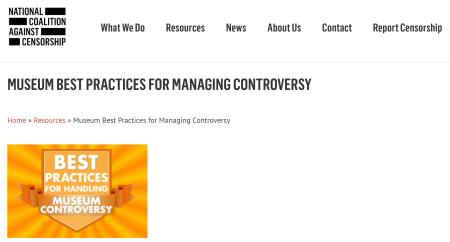Museum Best Practices for Managing Controversy

“The Museum Best Practices for Managing Controversy is designed to provide museums and other cultural institutions of any size or scope with guidelines that can help manage controversial content and transform controversy into a learning moment about the nature of diverse opinions and an institution’s ability to address them.
This non-binding document of best practices offers guidance to an institution concerned about or confronted with accusations of inappropriate, objectionable, or offensive content. Institutions caught in the frantic environment of controversy can refer to this set of strategies designed to calm the waters, open space for conversation and learning, and prevent or defuse a potentially volatile situation through deliberate steps to create meaningful dialogue.
When these guidelines are regularly used by cultural institutions and referenced as a recommended resource by their respective professional associations, the body of practice across the field becomes stronger and more consistent, building credibility and a positive image of all organizations. The simple ingredient of a nationally recognized protocol creating time and space to open dialogue may prevent an over-cautious, self-punishing reaction by institutions caught up in controversy. It may also encourage the institution to address sensitive issues of civic engagement and help fulfil the museum’s mission as a forum for the exploration of diverse ideas…
Taken together, the Free Speech Commitment and the procedures to anticipate and respond to controversy will help to:
• Equip an institution with the tools to respond to criticism of controversial content;
• Improve relationships with the public;
• Support the right of audience members to access a wide variety of work;
• Safeguard the exhibiting institution against self-censorship;
• Introduce transparency;
• Ensure institutional support of curatorial decision-making; and
• Provide board member orientation.
The promotion and use of these strategies by national organizations and leading institutions will help validate them as the best practices in the field, and will help create communities of support when controversy arises in a specific institution.”
